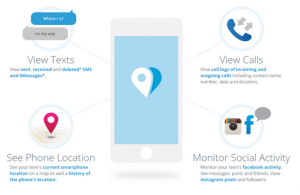European security Germany to search refugees' phones to establish identity, spot suspicious connections
German interior minister Thomas de Maizière will next week announce a new German anti-terror steps, which, among other things, will require refugees and asylum-seekers arriving in Germany without a passport to surrender their smartphones – and all the passwords and security pin numbers associated with the phones – so German security agencies could check the owners’ social media accounts. The security services in Denmark, Norway, Sweden, and the Netherlands already routinely examine refugees’ mobile phones to establish a refugee’s identity.

Cell phone searches can yield much information // Source: theconversation.com
German interior minister Thomas de Maizière will next week announce a new German anti-terror steps, which, among other things, will require refugees and asylum-seekers arriving in Germany without a passport to surrender their smartphones – and all the passwords and security pin numbers associated with the phones – so German security agencies could check the owners’ social media accounts. The goal is to make sure that refugees ad asylum-seekers who have posted suspicious posts on social media are subject to additional scrutiny.
EUObserver reports that de Maizière, announcing a series of anti-terror measures on Thursday, said that border police would pilot a plan which would require refugees resettled in Germany under the deal between Turkey and the EU, would be required to hand over their smartphones for security checks if they did not have passports.
“If you want to come to Germany, we have to make safety checks on you. And to make safety checks, we will ask you to show us your Facebook contacts from the last few months, which are public in principle anyway,” he said. De Maizière acknowledged that it is not yet clear whether the time and cost of carrying out the plan would justify the effort.
The smartphone-examination measure suggests that European security services have grown frustrated with traditional means of establishing a person’s identity at border crossings. “We frequently encounter cases where refugees often don’t carry identity documents, but do nearly all carry their smartphones,” the interior minister said.
De Maizière noted that fingerprinting refugees as they register in EU member states has also proven inadequate. In the case of the 16-year-old who attacked a group of people on a train near Würzburg, a fingerprint had been taken, but it could not be matched with the Europe-wide Eurodac database.
Smartphones, though, often include information which helps establish a person’s identity, because many refugees use them to stay in touch with friends and relatives.
Südwestrundfunk radio channel reported that earlier this week German police arrested a Syrian asylum-seeker on suspicion of planning to carry out a terror attack at the start of the Bundesliga soccer season next week. The report noted that the police found photos showing fighting in Syria on the suspect’s phone and computer.
EUObservernotes that the security services in Denmark, Norway, Sweden, and the Netherlands already routinely examine refugees’ mobile phones to establish a refugee’s identity.
Danish law allows immigration officials temporarily to confiscate phones if the devices are “presumed to be of importance in establishing a foreigner’s identity.” The law predates a series of tougher immigration controls Denmark enacted earlier this year. These measures, among other things, allow the immigration authorities to seize migrants’ cash and valuables to help pay some of the costs of their accommodation.
Richard Osterlund la Cour, a Danish police spokesman, told Politiken : “If you come to the country and say you are from Syria, but have nothing but your face to prove it, your mobile phone is the best way to determine if you are telling the truth.”
Earlier this year Politiken reported that immigration officers had confiscated the mobile phones of fifty-five unaccompanied migrant children, and that these children were unable to communicate with their families for more than a month as their phones were being examined.
Other measures de Maizière announced include increasing the number of police officers assigned to surveillance missions, placing many more surveillance cameras in public places, speeding up the deportation of foreign criminals, and revoking German citizenship from dual nationals if they have been found fighting for, or trying to join, militant groups abroad. De Maizière also said his office would examine the use of facial recognition software for surveillance in public spaces, and explore ways to relax the confidentiality regulations in order to make it easier for doctors, including psychologists, to tip off authorities about potential terror risks.
The interior minister, however, pointedly rejected calls to ban full-face veil for Muslim women in public places, and for abolishing dual citizenship altogether. “You cannot ban everything that you disapprove of. And I disapprove of the wearing of the burqa,” he said.
The security proposals are part of a 27-point Berlin declaration to be unveiled 18 August by Christian Democrat state interior ministers.
In a recent report, the Bundestag’s research service pointed out that a ban on full-face veil would most likely be incompatible with the German constitution and likely to be rejected by the constitutional court.
